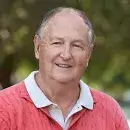
David W. Brady
David Brady began his teaching career at Kansas State University in 1970, from there moved to Houston, Texas, where he taught at both the University of Houston and Rice University, where in 1981 he was named Autry Distinguished Professor of Social Science. In 1986 he moved to Stanford University with a joint appointment in the Graduate School of Business and Political Science. While at Stanford he has served as Associate Dean for Academic affairs in the GSB and as Vice Provost for Distance Learning at Stanford. He has twice been a fellow at the Center for Advanced Study in the Behavioral Sciences. He presently holds the Bowen H. and Janice Arthur McCoy Professorship in Ethics at the Business School and is Deputy Director of the Hoover Institution.
Professor Brady’s teaching focuses on non-market strategy for corporations and ethical applications in building quality companies. In addition to his Business School teaching he also teaches an undergraduate course in public policy. He won the Dinkelspiel Award for service to undergraduates, the Richard Lyman Prize for service to alumni,the Bob Davies award and The Jaedicke silver cup from the GSB and the first Phi Beta Kappa Teaching Award given at Stanford. Brady has been on continuing appointment at Stanford University since 1987. He was associate dean from 1997 to 2001 at Stanford University; a fellow at the Center for Advanced Study in the Behavioral Sciences from 1985 to 1986 and again in 2001–2; and the Autrey Professor at Rice University, 1980–87.
He is currently working on a book which uses over 900 Gallup polls from 1937 - 2016 to determine how American electoral politics have shifted over this period. He is also working with other scholars at Stanford on a project to determine the stability of party identification over the 2004-2016 period. The data set is a unique panel of over 30,000 voters from YouGov time series. Finally, with scholars in Europe, he is working on the issue of how globalization effects political instability in OECD countries.